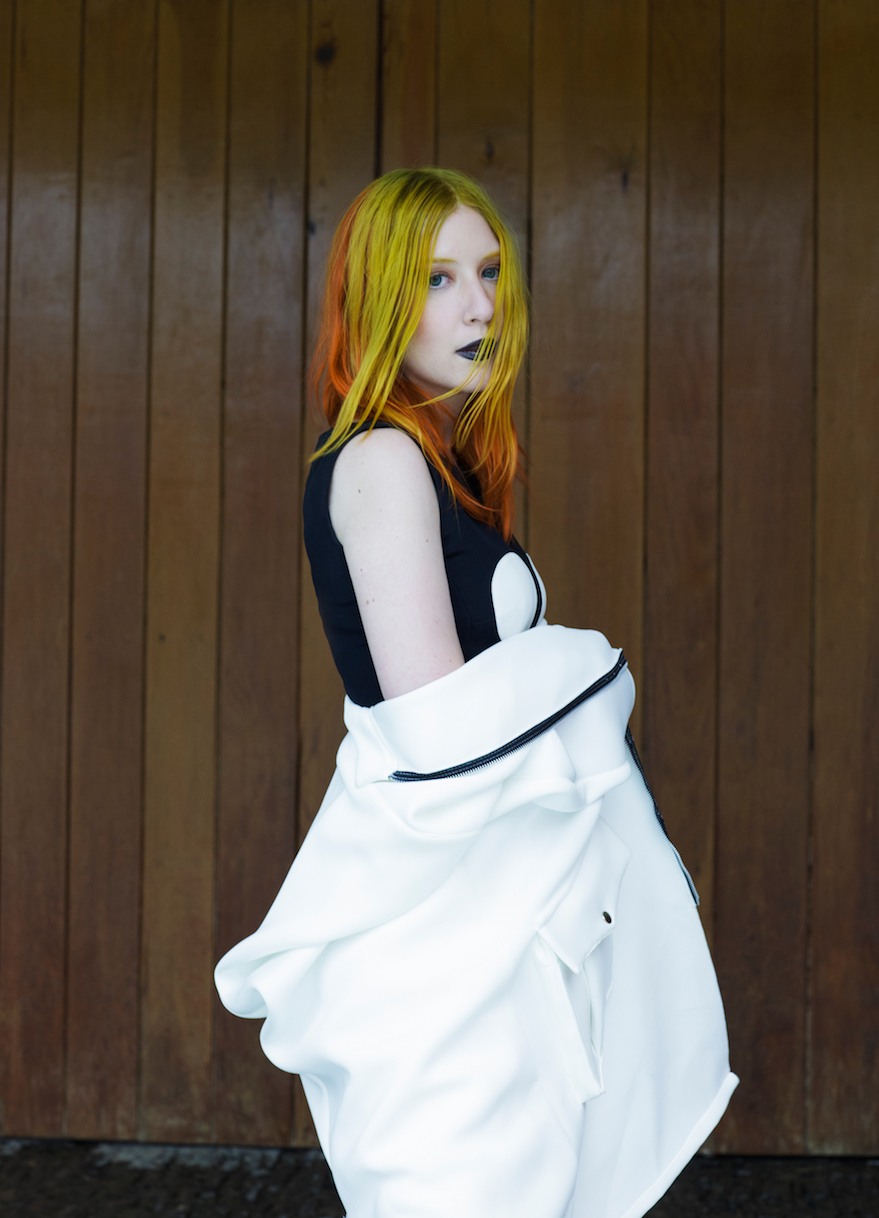Austra And The Future Of Politics
Katie Stelmanis on the radical ideas that shaped her new album, and the role technology should play in the world now.
 Photo by Renata Raksha
Photo by Renata Raksha
Katie Stelmanis is shook. After retreating to Mexico City following a worldwide tour for her 2013 sophomore album, Olympia, the frontwoman of the Toronto-based band Austra finally began to realize how splintered the current political and social atmosphere was. She immediately started doing homework. “I felt like my way of being proactive about everything that’s going on in the world right now was to learn about it and to educate myself,” she explains in between sips of ginger tea at Holy Oak in Toronto’s west end. Stelmanis’s newest release, Future Politics, situates her newfound perspective within the framework of holism, a philosophical theory which highlights the interconnection between body and space as a means to achieve greater clarity. On the album, songs about intimate responses to love and loneliness are placed next to tracks that explore controversial hot topics such as the possibility of post-capitalism and climate change. Simultaneously, she grapples with both personal matters and collective issues in an attempt to find a resolution for both.
Ever since rising to recognition in the early 2010s along with other Canadian artists popularizing chromatic synthpop, like Crystal Castles and Diamond Rings, Austra has been anchored by Stelmanis’s near-operatic voice. Dramatic and stirring, in the past she used it to drench dancefloor-ready tracks with a healthy dose of emotional reality. But that was before Donald Trump had been elected president and a palpable political tipping point had been reached. Now she’s utilizing her powerful vocals to call for a radical reimagination of the world around us. “A grave has been dug/ I'm looking for something/ To rise up above,” she sings over an industrial bassline on the album’s title track. It’s urgent, but not desperate; while everyone else seems focused on doomsday scenarios, Stelmanis remains hopeful. In our conversation, it was evident that she believes that the key to a better world relies on collective action — and that technology has a big part to play in that.
Your album came out on January 20, 2017 which is a significant day for a variety of reasons. How do you feel about the legacy of the 2016 election being tied to the album?
If it was any other album I don’t think it would feel very good but there’s just something relatively significant about it being that the album’s called Future Politics. I know a lot of bands were set to release on the 20th and then changed their release dates, but we thought that it made sense for our record. Maybe it’s a terrible idea. We put the record out as “pay what you can” for the first day of its release which my label head is super pissed about, but it was something I really wanted to do because I think it just ties with the theme of the record. It’s kind of a “fuck you” to the music industry.
When you were writing it did you feel responsible for including a variety of narratives and opinions as a way to incite some degree of action when people listen to it?
I was specifically inspired to write the album while reading a book called Inventing the Future: Post-Capitalism in a World Without Work. I wrote the song “Future Politics” immediately after I finished reading, which became the title of the album. [The authors Nick Srnicek and Alex Williams] basically have this theory that technology will free us from capitalism because it will result in the end a need for labour. They talk a lot about how current activism is based mostly on resistance rather than conceptualizing something new to bring to the table which I really grabbed on to. I feel like Black Lives Matter is one of the more progressive and well-thought-out movements, as opposed to the Occupy movement that didn’t have a concrete objective, which is why it ultimately dissolved.
The video for “Utopia" features a black device that says “Rainforest” in the Amazon typeface. Given the themes of post-capitalism elsewhere on the album, what symbolic function did it serve?
It represents two things: it’s about being controlled by this technology, and it’s also about technology being kind of your only social interaction. We have all these fake relationships and fake interactions with technology. It might not feel like it but we’re definitely all completely trapped and enslaved by our technological devices.
 Photo by Renata Raksha
Photo by Renata Raksha
“We constantly need to take advantage of technology before the tech companies figure it out.”
In a lot of ways technology has also provided access to voices that might have a history of invisibility. Do you think there’s a grey area with our new dependence on technology?
I generally think of technology as this amazing, powerful thing, but I don’t think that we’re utilizing it in the most beneficial way. I think the fact that the Arab Spring could happen basically via Facebook is something that I’m not really sure could happen now because certain algorithms would have caught on. We constantly need to take advantage of technology before the tech companies figure it out. I’m excited by big projects that nobody wants to finance or fund because they don’t make sense for the economy, like sustainable high-speed transportation everywhere in the world.
Do you think there’s a way to combine advocacy for identity politics with ideas for social change on a larger scale?
I think that individual people just need to think big. I think that there’s lots of interesting local initiatives that are super important, but I also think that there needs to be some kind of bigger connection.
Individualism is definitely a problem, but I think that’s obviously more in the sense of “everybody do it yourself” as opposed to individual identity. I really appreciate in some ways keeping [identity politics] separate. As a queer person, there’s something nice about integration but there’s also something really nice about being surrounded by only queers. I imagine that’s the same in a lot of other contexts. I experienced [queer spaces] during Will Munro’s Vazlaeen parties in Toronto [in the late 90s to the mid-2000s]. It was truly a very, very diverse crowd and I feel like I was spoiled to come of age going to that party because it made me so comfortable with being queer in general. Making sure that there’s space for everyone to have that is important.
But I think that when we’re talking about envisioning a better world, communication needs to happen specifically with young people through social media. There needs to be some sort of global movement, which is kind of happening right now with right-wing fascism, which sucks. I think that the opposite answer needs to be something people are willing to get behind on a mass scale and I don’t think that there has been an inspiring enough message to really create that yet.
If you had to offer some recommendations to folks with decision-making power on what the world would look like under “future politics” what would you suggest?
I would quote [the poet] Adrienne Rich and say that I envision a world without oppression of any kind and based on sustainability instead of growth. There would be a lot of green space. There would be a lot of affordable housing. I would like to slow Toronto down a lot so people only have to work like 20 hours a week. My grandma was Italian and lived in downtown Toronto and never learned how to speak English her entire life. She just had this insane garden that was like an urban farm just had her own world that completely existed outside of Toronto itself. I kind of like that but at the same time I want more of a community vibe. When I think of future politics, I think of a techno-paradise where there’s lots of really cool inventions. Like Fifth Element but more environmental.
